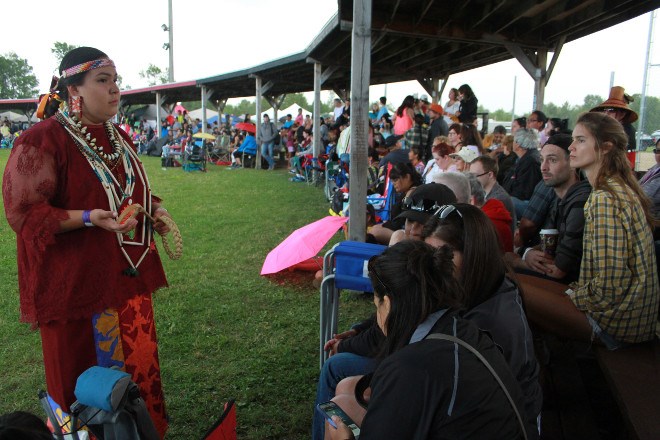Hosting large events that are geared towards showcasing a community are often a means for businesses to advertise and form partnerships as well.
In Wikwemikong Unceded Indian Territory, its major events, like powwows, golf tournaments and fishing derbies, are used to draw visitors in to enjoy the culture and community spirit, as well as generate revenue for local businesses and off-reserve sponsors.
Mitchell Manitowabi, tourism assistant with the Wikwemikong Development Commission, and one of the original commission employees, said when they approach businesses for event sponsorships, like the annual Cultural Festival in August and Ice Fishing Derby in February, they offer incentives, like advertising on social media, websites, all print ads, radio ads, and offer sponsorship levels.
“It builds that partnership with Wikwemikong and Wikwemikong Tourism,” he said. “Anything we need, we have all the businesses we go to first, in regards to materials and supplies. We build that relationship with them.”
By fostering good business partnerships, he said many of the returning sponsors don’t hesitate to agree to sponsor again. During the event, they have their logos on all advertising, and they get honourable mentions during the event.
It’s mutually beneficial for both Wikwemikong and nearby local communities. The places they advertise events in are places people from Wikwemikong go to, like Espanola and Sudbury, as well as businesses on the island.
“They are already familiar. I always say Wikwemikong, but people say ‘Oh, Wiki,’ so they already know where it is.” He said. “It does help band members to visit their businesses.”
Their advertising and sponsorship is both broad and strategic. Manitowabi said they have stations that appeal to specific age groups to get as many people out as possible on the island, and nearby cities like Sudbury.
Many of them come back, he said, because they really enjoy the experience and the unique nature.
“For the derby, it’s unique, and it’s a family event,” he said. “A lot of people, it’s their first time in a derby, and it gains a lot of steam that way. That’s the novelty, anyone can win.”
He said it’s been a natural progression for the commission to grow as the reserve aims to grow their events and attractions. Eventually, the goal of the commission is to be self-sustaining and continue to expand First Nation tourism.
"First Nations tourism in Canada is a booming business,” he said. “We have people coming from Germany, other parts of Europe and even parts of Asia just to visit a reserve. What they usually see and think of First Nations is what they see in movies. Then they come here, and they are like ‘Wow, they don’t live in teepees and don’t walk around in buckskin.' And they are generally interested in the culture. That’s why we are here.”
Naomi Mishibinijima, tourism arts development officer at Wikwemikong Development Commission, explained the tourism arts is part of the commission’s mandate to “support and enhance economic development sustainability within the community.”
“That is part of why we do this; it is economic-driven,” she said. “We haven’t been keeping exact numbers, but it does spill into areas like accommodation, Andy’s, which is one of the bigger businesses. Plus, local businesses participate and have prizes like gift certificates. And hopefully that brings in more people, or they tell other people.”
There are many departments in the commission, and tourism arts brings in visitors, which includes tourists and non-residence visitors.
She explained their larger events, like their annual Cultural Festival, held in August, by their nature bring in a lot of visitors from everywhere. That festival, she said, is also part of a competitive pow wow tour, where professional dancers compete for prizes and sport rankings.
“I consider them professional dancers. That’s what they do,” she said. “They go to all over North America. They take their winnings and that takes them to the next one.”
These events are also revenue generators for the commission’s programs. Their annual golf tournament helps raise funds for youth programming.
To attract people, she said they have to make it unique. The annual Ice Fishing Derby, held every second weekend in February, is the only tagged fish derby in Northern Ontario. Every year, they release tagged fish, and prizes are given out based on a first-caught basis.
This year, she said to make it interesting, the top two prize winners get an option of either cash, or a prize package of equal value, then the top 10 go by weight.
Through marketing and advertising, they have amassed a wide variety of sponsors, from legal firms, to breweries and even construction and industrial companies.
The commission itself has grown exponentially in the past two years, from two people, to six full-time.
“It’s great to be part of a growing department,” she said. “I can just see all the things we have on the go, and I think to myself, 'How did those two do all this?'”




